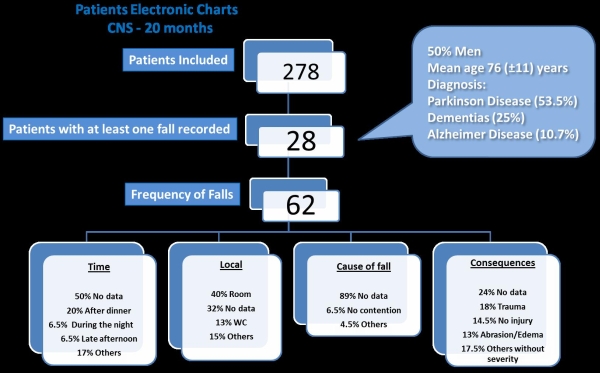Session Information
Date: Thursday, June 23, 2016
Session Title: Other
Session Time: 12:00pm-1:30pm
Location: Exhibit Hall located in Hall B, Level 2
Objective: This study aimed to identify the frequency and characteristics (causes, circumstances, consequences), of falls that occurred at Campus Neurologico Senior from Oct 2013 until Jun 2015; and define preventive strategies and interventions tailored to the specific causes of the falls identified.
Background: Individuals with Neurodegenerative diseases are typically at falls risk mainly due to the deficits of motor and cognitive functions. These patients are often institutionalized but limited information is available regarding the frequency and circumstances of falls that occur in inpatient context.
Methods: Retrospective analysis of patient electronic charts of individuals institutionalized at a nursing home which provides multidisciplinary care to patients with Neurodegenerative Diseases. Definition of preventive falls strategies aimed at minimizing the falls risk of inpatients based on the results obtained.
Results: Of the total of 278 inpatients, 62 falls were registered. The group included 28 patients (50% men) with a mean age of 76 (±11) years with the following diagnosis: Alzheimer’s disease, Parkinsonian syndromes, and other dementia syndromes. We observed that there was a higher incidence of falls after dinner (20%) when patients were in their rooms (40%). Most records were incomplete and the main omission was generally about the falls causes (89%), which in 18% resulted in minor trauma. There was also a lack of a common language use by the health professionals responsible for registering falls. Nurses were the health professionals that most registered the falls. Based on these results falls prevention strategies were defined and included the development of educational training sessions to all CNS professionals about when and how falls where happening at the nursing home, ways to prevent them and how to register them more effectively; and setting an alert period after dinner with more surveillance on people at higher risk. 
Conclusions: Our results show that falls are frequent in nursing home inpatient′s context and occur mainly in the evening, when patients are most unaccompanied. Missing data is a sign that education strategies towards better registries are needed. Future assessments of falls records will be important in order to allow for better preventive strategies to be implemented.
This abstract was previously presented at the first International Congress of Center for Interdisciplinary Research Egas Moniz. Nov 2015.
To cite this abstract in AMA style:
C. Godinho, J.M. Domingos, A.S. Pereira, M. Duarte, J.J. Ferreira. Frequency of falls in nursing homes for neurodegenerative diseases [abstract]. Mov Disord. 2016; 31 (suppl 2). https://www.mdsabstracts.org/abstract/frequency-of-falls-in-nursing-homes-for-neurodegenerative-diseases/. Accessed February 11, 2026.« Back to 2016 International Congress
MDS Abstracts - https://www.mdsabstracts.org/abstract/frequency-of-falls-in-nursing-homes-for-neurodegenerative-diseases/
